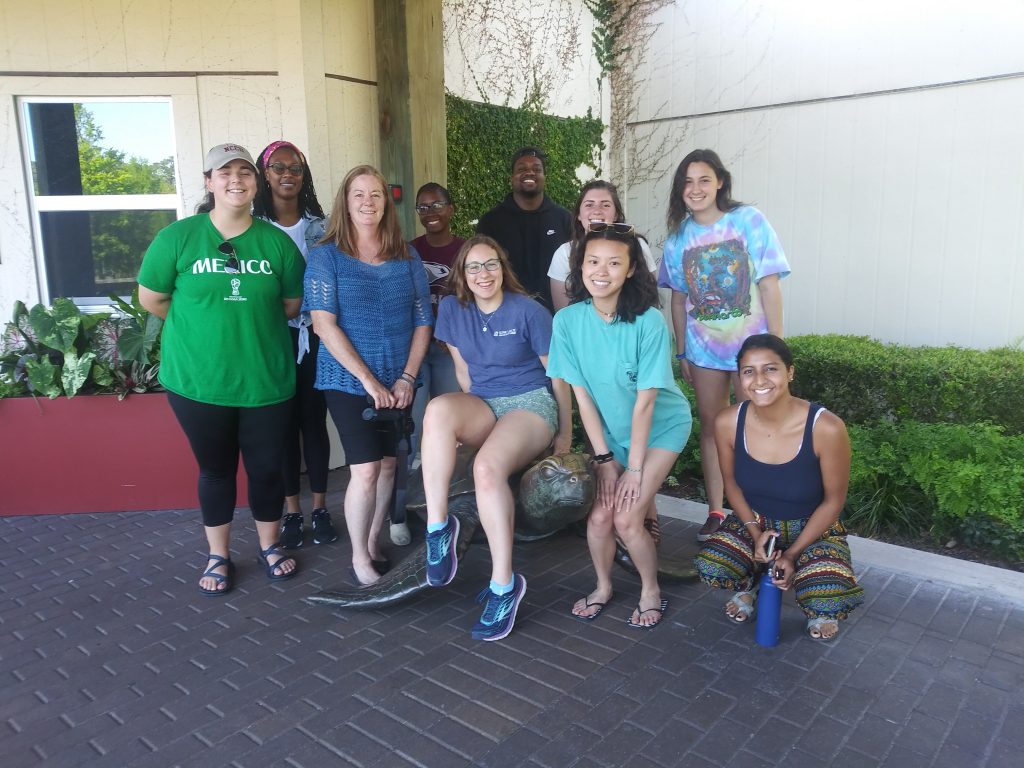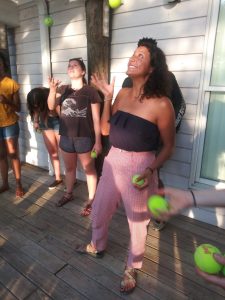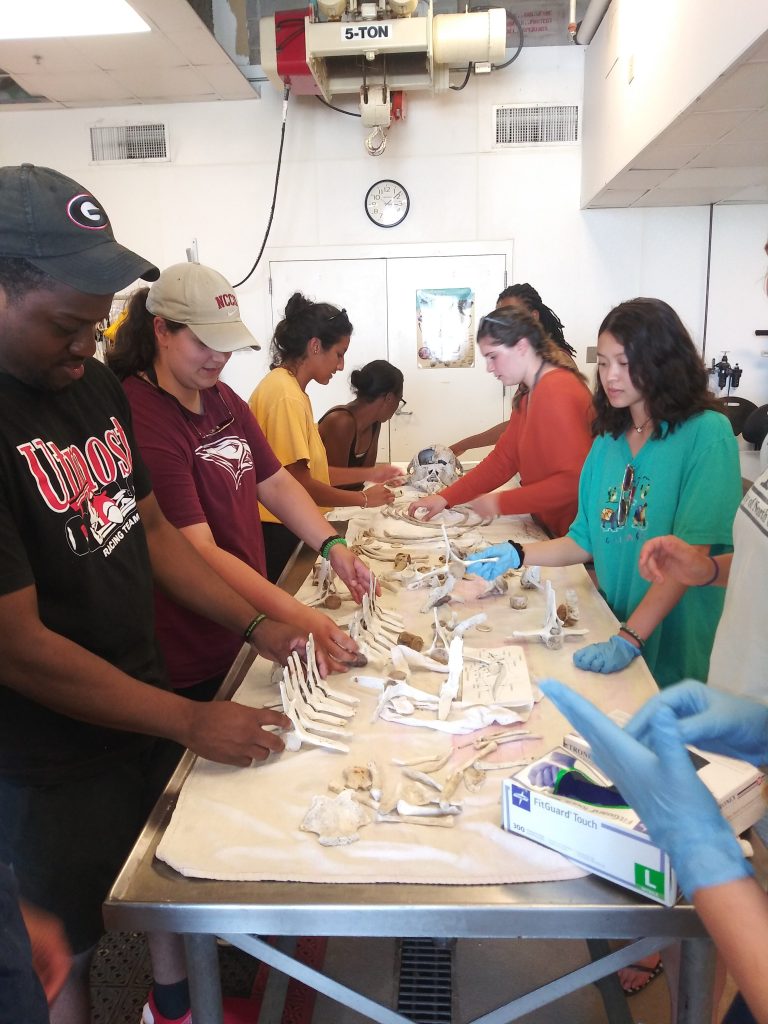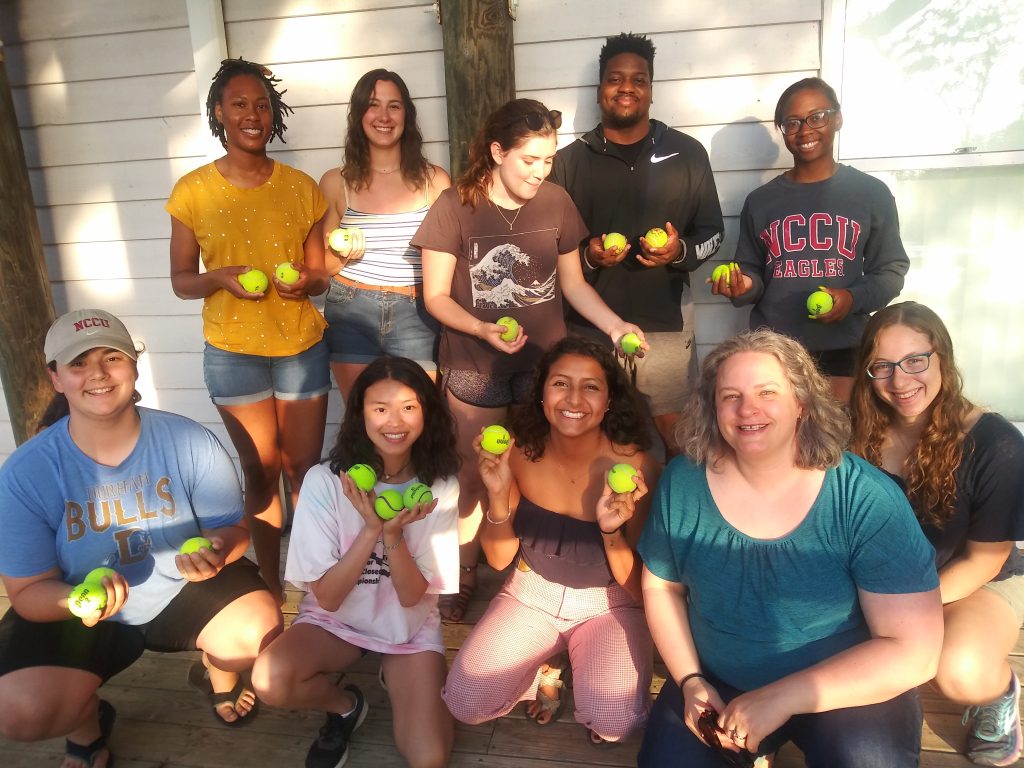Geoscience students embark on retreat through coastal NC
June 30, 2019
On May 22, nine undergraduate students from the University of North Carolina at Chapel Hill and North Carolina Central University set out on a three-day retreat to explore the coast of North Carolina and broaden their knowledge and appreciation of the life of a geoscientist.
These students are part of a rigorous research program known as the Increasing Diversity and Enhancing Academia (IDEA) program. Led by Program Manager Megan Hughes and Kathleen Gray, the principal investigator of the grant funding IDEA, at the UNC Institute for the Environment, this research experience is centered around exposing undergraduates to the fields of environmental science, geography, geology and marine science.
Through this program, which is comprised of a ten-week summer research experience and six “Saturday Intensives” during the school year, students work directly with professors, graduate students, postdoctoral researchers and lab technicians to complete unique research projects and learn the different elements of a career in scientific research. The purpose of the IDEA experience is not only to inspire students to pursue a career in scientific research, but to enhance their collaboration and problem-solving skills. While the IDEA program supports many kinds of students, participation by female students and students of color is especially encouraged.
The retreat began with a trip to North Carolina’s Crystal Coast to visit the Pine Knoll Shores Aquarium. Students met with Carol Price, the conservation research coordinator for the North Carolina Aquarium System, to discuss careers in geosciences and the importance of gaining research experience. Price also introduced the students to the aquarium’s new living shoreline, a conservation and land-management project that serves as a nursery for aquatic creatures and plants as well as a natural protector of the shore’s fragile beach grass.
The students spent their downtime at the Trinity Center in Pine Knoll Shores, where they participated in team building activities such as working together to build contraptions that can catch a dropped golf ball using only tape, drinking straws, and a rubber band. Hughes also taught the students how to juggle, which she believes provides a helpful lesson about the process of becoming a scientific researcher.
 “It’s sort of an allegory for how to approach science,” Hughes explains. “Learning to juggle is sequential and research is too. Sometimes you need to back up a step and build up your confidence with the last skill before moving forward again.”
“It’s sort of an allegory for how to approach science,” Hughes explains. “Learning to juggle is sequential and research is too. Sometimes you need to back up a step and build up your confidence with the last skill before moving forward again.”
The next day, the students took a boat ride to Shackleford Banks with Joel Fodrie, an associate professor at the UNC Institute of Marine Sciences. Fodrie discussed his own research in marine science and the wide variety of career opportunities that exist within the field. He also led the students on a journey to observe the wild horses inhabiting the barrier island.
 The final day of the retreat was spent kayaking to the Rachel Carson Estuarine Reserve. Students met with Vicky Thayer, the marine mammal stranding coordinator for the Marine Mammal Stranding Network of the North Carolina Central Coast. Students examined a stranded dolphin, learned about the effects of water pollution on marine life and discussed the rich biodiversity of marine mammals inhabiting the waters off the North Carolina coast. They also learned about dolphin adaptations and physiology through hands-on activities, including one in which they worked together to put the skeleton of a bottlenose dolphin back together.
The final day of the retreat was spent kayaking to the Rachel Carson Estuarine Reserve. Students met with Vicky Thayer, the marine mammal stranding coordinator for the Marine Mammal Stranding Network of the North Carolina Central Coast. Students examined a stranded dolphin, learned about the effects of water pollution on marine life and discussed the rich biodiversity of marine mammals inhabiting the waters off the North Carolina coast. They also learned about dolphin adaptations and physiology through hands-on activities, including one in which they worked together to put the skeleton of a bottlenose dolphin back together.
Before returning to Chapel Hill, the group met with Niels Lindquist, a professor at UNC’s Institute for Marine Sciences, to discuss another aspect of the living shoreline of Pine Knoll Shores: oyster colonization. Lindquist described to the students how IMS is using biodegradable materials to build a structure made of plant fiber cloth and cement that can be formed into components that fit together to build a scaffolding for oysters. This design will encourage the growth of oyster colonies and ensure the protection of the shoreline.
The retreat took place two days after a kick-off luncheon held in Venable Hall at UNC, in which students had the opportunity to get to know their faculty mentors as well as the other participants.
“The kick-off was a chance for the students to build rapport with one another as they begin what, for many of them, is a first research experience. It is also the beginning of a supportive research community in which students and mentors learn from each other and become collaborators,” says Hughes.
During the summer, the students will convene each week to learn about how to build skills as aspiring scientific researchers. Each week will feature a workshop dedicated to topics such as effective communication, building a strong resume and curriculum vitae, and crafting high-quality scientific reports and posters. The summer sessions will conclude with a symposium in which students will present the research methods, analyses, and conclusions of their projects with a scientific poster. This summer sign- off is intended to provide students with valuable experience in presenting their research in a professional setting.
Below are the students participating in the IDEA program this year as well as the faculty mentors with whom they will be working and the field of study upon which their projects will be based.
- Iris Chien (UNC) – Alecia Septer, Stephanie Smith; Marine Sciences
- Natalie Gauger (UNC) – Diego Riveros-Iregui, Joseph Delesantro; Geography
- Isabel Gutierrez (NCCU) – Karl Castillo, Justin Baumann; Marine Sciences
- Nateja Hale (NCCU) – Carresse Gerald; Earth and Geospatial Sciences
- Maribel Herrera (UNC) – Diego Riveros-Iregui, Andrew Murray; Geography
- Aundre Jackson (NCCU) – Carresse Gerald; Earth and Geospatial Sciences
- Chloe Kent (UNC) – Xiao-Ming Liu, Cheng Cao; Geological Sciences
- Rachael Rankin (UNC) – Emily Eidam; Marine Sciences
- Lettia Spruill (NCCU) – Rebecca Fry, Hadley Hartwell; Environmental Health
- Sage Turek (UNC) – Donna Surge, Kylie Palmer; Geological Sciences
The group will switch gears once the school year begins as each student participates in six Saturday Intensives. For each intensive, students will travel to research facilities, labs, and worksites to experience first-hand how scientific researchers work day-to-day.
Story by Dylan Morgan ’22
Dylan Morgan is an environmental science major at UNC and is part of the graduating class of 2022. This summer, he is working as a communications intern at the UNC Institute for the Environment. Morgan’s career aspirations combine environmental research with journalistic storytelling, particularly in the fields of ecological restoration and natural resource conservation.

